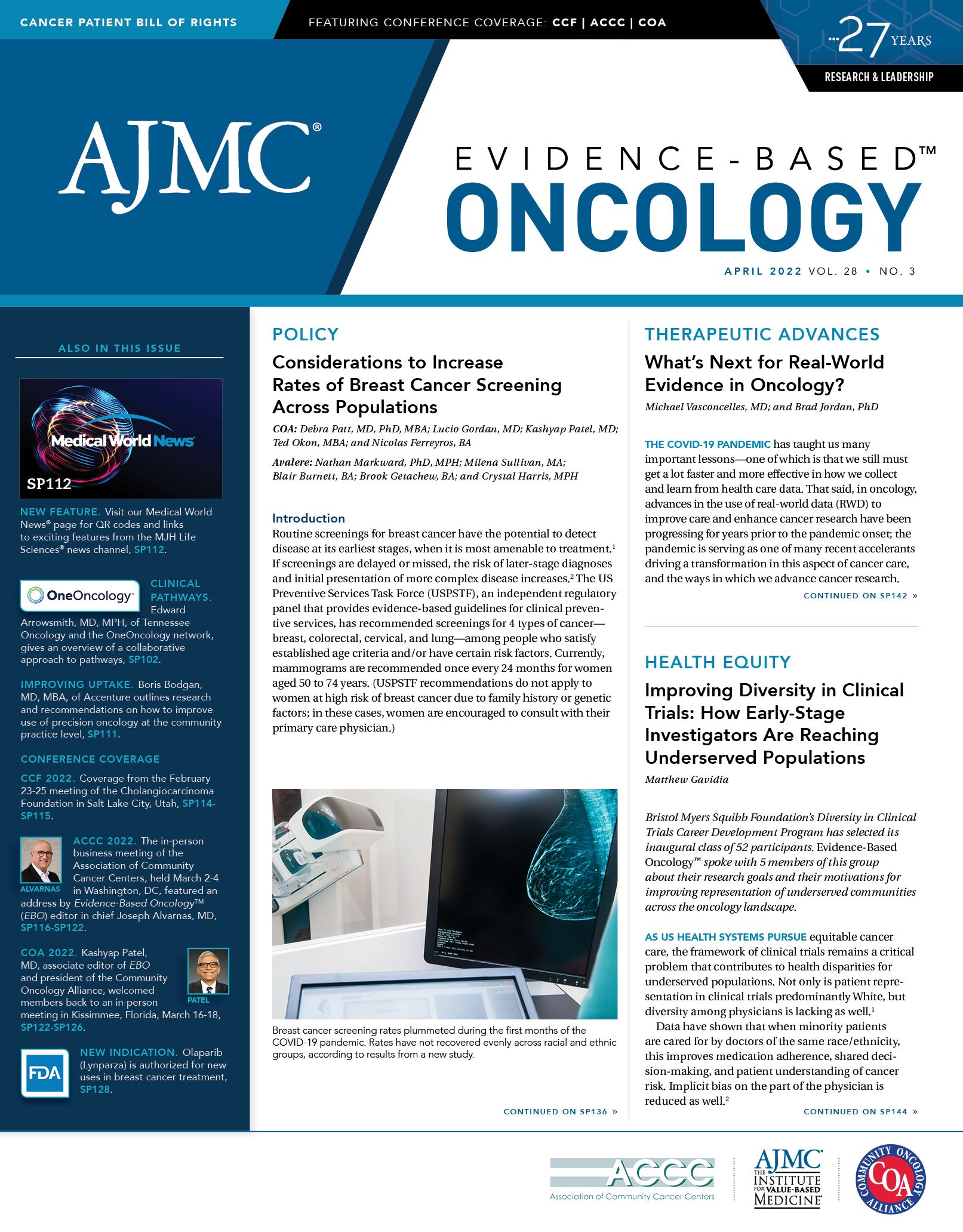- Center on Health Equity & Access
- Clinical
- Health Care Cost
- Health Care Delivery
- Insurance
- Policy
- Technology
- Value-Based Care
We Need a Cancer Patient Bill of Rights
From the editor-in-chief of Evidence-Based Oncology.
The hardest journeys in this world begin with the words, “You have cancer.” As a physician who has uttered these words too many times to patients and families, I have a full realization of their weight. For many patients across this country, this transformational moment is one of profound disempowerment, often shrouded in fear and deep uncertainty. As clinicians we must bring both compassion and a deep-seated humility when guiding a patient through a time in which everything that they and their family knew before has been irrevocably changed. Their hopes, dreams, expectations, ambitions, and milestones are now predicated upon vanquishing a foe that is far too often shrouded in mystery, mythology, and implacability.
As patients and families begin their respective cancer journeys, often they must combat both cancer and a health care system that can be indifferent or hostile to their needs. At these times, the readily deployable tools of health care efficiency—narrow networks, step therapy, prior authorizations, utilization management, appeals processes—all present an existential threat to their well-being and make an already arduous journey even more painful and dehumanizing. Truth be told, when the cost-centered, relentless quest to improve value in health care turns into an obsessive and relentless pursuit of the lowest cost care, the patient’s journey becomes all the more difficult. Physicians should never be forced to become gatekeepers instead of caregivers. The quest for a cure should not be a journey measured in the number of appeals and denials that it takes to get there.
The dynamic nature of a cancer journey is unlike any in health care. Although data from the American Cancer Society show survival rates improved by 31% between 1990 and 2018, too many patients still lack a path toward a cure. The profound value of access to innovative therapeutics and the dynamic evolution of genomics-informed treatments portend a future of continued dramatic improvements in care outcomes. Yet disparities in care access and outcomes abound. As the 2020 American Association for Cancer Research Progress Report made so clear, these disparities persist across racial, ethnic, economic, and geographic lines. For patients who are Medicaid beneficiaries, care outcomes continue to lag those of patients with commercial insurance. For the most vulnerable members of our society, the journey to wholeness is more difficult, more fraught, and more unpredictable.
It is time to ensure that the needs of patients with cancer and their families become the central guiding principle of value-based care. Late in 2021, the California State Assembly became the first in the US to pass a Cancer Patient Bill of Rights (See SPXXX). In a time of political polarization and hyperpartisanship, the resolution was passed by both houses of the assembly in a unanimous vote. Cancer recognizes no party affiliation, and the enormous human toll of this set of diseases has touched virtually everyone in the country with an indiscriminate brutality. As such, we are inescapably united in our desire to defeat cancer.
The Cancer Patient Bill of Rights aims to ensure that all patients understand their diagnoses, have access to the latest care insights and precision medicine solutions, have access to necessary subspecialty care, have scalable access to whatever site of care can best address their needs during that part of their treatment journey, and can enroll in potentially lifesaving clinical trials without delay or undue barriers to access.
Over the past year in Evidence-Based Oncology™ we have reviewed the dynamically evolving nature of cancer care, spoken with experts on care disparities, and listened to health care transformation leaders point toward sustainable solutions for better systems of care. Each journey begins with a first step. The Cancer Patient Bill of Rights is one of those first steps. As we move toward the realization of more equitable care, care without barriers or unnecessary delays, and better outcomes for more patients, we look toward the community of cancer leaders and stakeholders, including community and academic physicians, systems leaders, diagnostic and therapeutic innovation creators, and policy makers to make this goal a reality.

Exploring Racial, Ethnic Disparities in Cancer Care Prior Authorization Decisions
October 24th 2024On this episode of Managed Care Cast, we're talking with the author of a study published in the October 2024 issue of The American Journal of Managed Care® that explored prior authorization decisions in cancer care by race and ethnicity for commercially insured patients.
Listen
